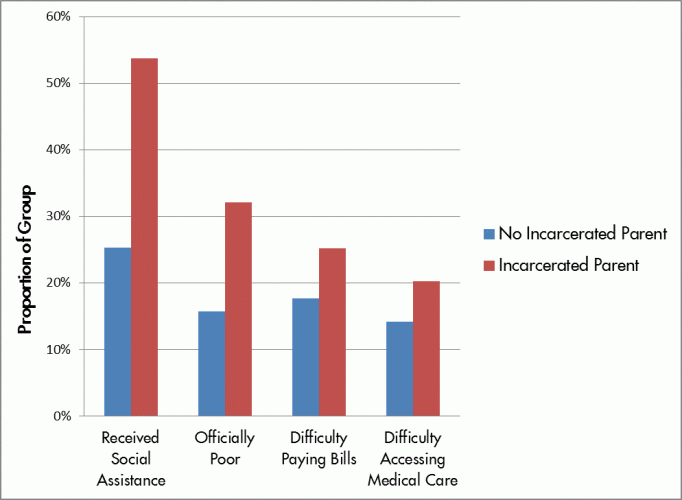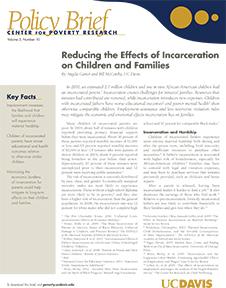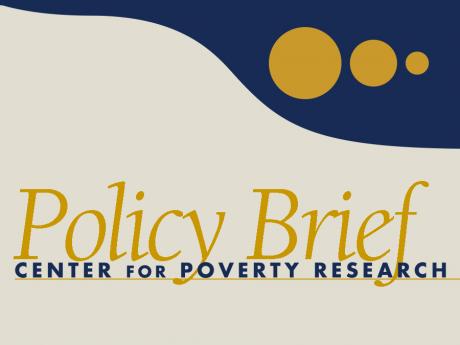Reducing the Effects of Incarceration on Children and Families
By Angela Carter and Bill McCarthy, UC Davis
In 2010, an estimated 2.7 million children and one in nine African-American children had an incarcerated parent.[1] Incarceration creates challenges for inmates’ families. Resources that inmates had contributed are removed, while incarceration introduces new expenses. Children with incarcerated fathers have worse educational outcomes[2] and poorer mental health[3] than otherwise comparable children. Employment assistance and less restrictive visitation rules may mitigate the economic and emotional effects incarceration has on families.
Many children of incarcerated parents are poor. In 2004, about half of inmates with children reported providing primary financial support before they were incarcerated. About 30 percent of these parents reported monthly incomes of $1,000 or less, and 63 percent reported monthly incomes of $2,000 or less.[4] Of inmates who were parents of minor children in 2004, about 9 percent reported being homeless in the year before their arrest. Approximately 20 percent of these inmates were unemployed prior to their incarceration and 12 percent were receiving public assistance.[5]
Key Facts
- Imprisonment increases the likelihood that families and children will experience material hardship.
- Children of incarcerated parents have worse educational and health outcomes relative to otherwise similar children.
- Minimizing the economic burdens of incarceration for parents could help mitigate its long-term effects on their children and families.
The risk of incarceration is unevenly distributed by race, class, and gender. Economically marginal minority males are most likely to experience incarceration. Those without a high school diploma are more likely to be in poverty,[6] and they also have a higher risk of incarceration than the general population. In 2008, the incarceration rate was 12 percent for White males who did not complete high school and 37 percent for comparable Black males.[7]
Incarceration and Hardship
Children of incarcerated fathers experience more intense material hardship both during and after the prison term, including food insecurity and insufficient resources to purchase other necessities.[8] A father’s incarceration is associated with higher risk of homelessness, especially for African-American children.[9] Families may have to contend with legal and visitation expenses, and may have to purchase services that inmates previously provided, such as childcare and home repairs.
After a parent is released, having been incarcerated makes it harder to find a job.[10] It also depresses the earnings of those who find work.[11] Relative to pre-incarceration, formerly incarcerated fathers are less likely to contribute financially to their families and give less when they do.[12]
Impact on Children
Parental incarceration affects children who are already disadvantaged, and its effects depend in part on preexisting relationships. A parent’s incarceration may improve children’s lives if, for example, the parent is aggressive or violent. A parent’s substance abuse or involvement in crime may destabilize family life independent of incarceration.
This is especially the case for incarcerated mothers. Because mothers are generally less likely to be incarcerated than fathers, women who are incarcerated may face relatively greater challenges than their non-incarcerated counterparts. Thus, literature on the causal effects for maternal incarceration is less consistent while evidence suggests that paternal incarceration typically affects children negatively.
Incarceration is stigmatizing and can affect the way children are treated by others. Teachers describe children with incarcerated parents as less competent regardless of their actual academic performance. This illustrates the effects of subconscious biases linked to parental incarceration.[13] Children who experience parental incarceration are less likely to complete college.[14] Research has also found that children who experience paternal incarceration are at greater risk of health problems ranging from depression and anxiety to asthma and HIV/AIDS.[15]
Reducing the Effects of Incarceration
We cannot conclusively state what types of incarceration are less harmful for children and families, although targeted use of shorter or out-of-custody sentences would reduce the strain families experience while minimizing negative effects on public safety.
Establishing less restrictive visitation rules or incarcerating people geographically closer to home may help facilitate the maintenance of family ties. Increasing wages for prison work and reducing costs associated with incarceration would help decrease the financial burden that families experience.
Employment support, both pre- and post-release, may better enable people on parole or probation to confront economic burdens. Limiting the effect of a criminal record on post-release employment through simpler expungement processes or decreased use of background checks could also help mitigate the long-term effects of incarceration on families. Education and outreach campaigns for teachers may help reduce unconscious bias against the children of incarcerated parents.
Angela Carter is a Ph.D. student in Sociology at UC Davis.
Bill McCarthy is a Professor of Sociology at UC Davis.
[1] The Pew Charitable Trusts. 2010. “Collateral Costs: incarceration’s Effects on Economic Mobility.”
[2] Foster, Holly et al. 2009. “The Mass Incarceration of Parents in America: Issues of Race/ Ethnicity, Collateral Damage to Children, and Prisoner Reentry.” The ANNALS of the American Academy of Political and Social Science.
[3] Wilbur, MaryAnn B. et al. 2007. “Socioemotional Effects of Fathers’ Incarceration on Low-Income, Urban, School-Aged Children.” Pediatrics.
[4] Glaze, Lauren E., et al. 2008. “Parents in Prison and Their Minor Children.” Bureau of Justice Statistics.
[5] Ibid.
[6] National Center for Education Statistics. 2011. “America’s Youth: Transitions to Adulthood.”
[7] Pettit, Becky. 2012. “Invisible Men: Mass Incarceration and the Myth of Black Progress.” Russell Sage Foundation.
[8] Schwartz-Soicher, Ofira, Amanda Geller, et al. 2009. “The Effect of Paternal Incarceration on Material Hardship.” Social Service Review.
[9] Wildeman, Christopher. 2013. “Parental Incarceration, Child Homelessness, and the Invisible Consequences of Mass Imprisonment.” The ANNALS of the American Academy of Political and Social Science.
[10] Pager, Devah. 2007. Marked: Race, Crime, and Finding Work in an Era of Mass Incarceration. University of Chicago Press.
[11] Pettit, Becky, et al. 2009. “Incarceration and the Legitimate Labor Market: Examining Age-Graded Effects on Employment and Wages.” Law & Society Review.
[12] Geller, A., et al. 2006. “The effects of incarceration on employment and wages: An analysis of the Fragile Families Survey.” The Center for Research on Child Wellbeing.
[13] Dallaire, Danielle H., et al. 2010. “Teachers’ Experiences with and Expectations of Children with Incarcerated Parents.” Journal of Applied Developmental Psychology.
[14] Hagan, John and Holly Foster. 2012. “Intergenerational Educational Effects of Mass Imprisonment in America.” Sociology of Education.
[15] Lee, Rosalyn D., Xiangming Fang, et al. 2013. “The Impact of Parental Incarceration on the Physical and Mental Health of Young Adults.” Pediatrics.
#povertyresearch













